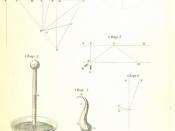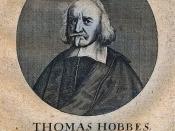Rene Descartes, Thomas Hobbes and David Hume are well known philosophers of the time. These three men were after the truth. The truth about life. The truth about how one exists. The truth about the world around them. They questioned, thought, and reasoned. This is what they did. There goal was to arrive at true and certain knowledge.
Descartes and Hobbes were both rationalists. They did not trust their senses. Senses deceive and cover up the truth. The only truth was that based on reason and rational arguments. Hobbes used Descartes reasoning as some of his fundamentals for discovering the truth. He learned a lot from Descartes.
Descartes based everything he knew on Science. Science was the fundamental bases for everything he thought. Things have to follow a specific method, with no assumptions. For example, Mathematics, one plus one equals two. That is a basic fundamental of math that everybody can understand and cannot question.
When is one plus one not equal to two? Never. It can also be proven that one plus one equals two.
Knowledge, for Descartes, was systematic. After establishing one point, through, of course a rationalists view, lead to another question, followed by a conclusion. He kept posing and answering questions he had. This went on until he reasoned everything he could have possibly questioned.
Hobbes uses Descartes for the bases for his voyage to find the truth. His quest is to find out why we all exists and why we all are here. Hobbes believes that pleasure is the sole objective of motivation. This would explain why people do the things they do. A good example of this would be if a wealthy person donated to a charitable organization. What was the persons motives for donating? The person probably felt good about doing it,


